Mental health has a direct impact on how we think, feel, learn, work, and enjoy our life. According to a Harvard University survey published in 2020, more than 30 per cent of Harvard students experienced anxiety-related emotional distress, with many worrying about falling behind due to a lack of effort. This issue of My UM explores how students reduce the pressures of university life and manage their emotions, and looks at the mental health support network available at the university.
Removing the psychological burden of learning
It is inevitable that students encounter various academic pressures as they progress through their academic journey. This was the case for Zhang Lingxiao, a fourth-year history student of Moon Chun Memorial College (MCMC) at the University of Macau (UM) who won the second UM Mental Health Public Speaking Contest. In his winning speech, he explored the anxiety that students often experience in the midst of fierce competition—commonly referred to as neijuan in Chinese, which signifies a relentless rat race. Zhang provided an example to illustrate this phenomenon: ‘For instance, when a professor assigns a 2,000-word essay, there are always some “overachievers” who insist on writing 7,000 or 8,000 words, raising the bar for achieving high grades. Consequently, all students, as competitors, feel compelled to put in even more effort.’
During his speech, Zhang took a philosophical perspective to contrast gaming and studying, aiming to help his fellow students understand their source of anxiety and rediscover a sense of inner balance. He pointed out that in both competitive realms of video games and academics, people often find themselves drawn to continuous gaming rather than studying. ‘This preference arises because game scores do not determine our lives or future, allowing us to enjoy the pleasure of the gaming process. However, our academic scores carry different weight. They may impact our future prospects, creating a psychological burden on our learning and leading to anxiety,’ he explained.
So, how can students remove the psychological burden of learning? Zhang’s opinion is that finding joy and value in the learning process can help alleviate the burden, as they are sustainable sources of long-term motivation. He uses reading academic monographs as an example, emphasising that although the writings of some scholars may be intricate and challenging to comprehend, their perspectives are enlightening. ‘I would read it a few more times or consult professors to help me understand the logical progression of the arguments. Although the process may be demanding, the moment of happiness when you finally grasp what a theorist intended to convey is priceless.’
A heart-healing journey
During his second year at university, Zhang experienced anxiety due to interpersonal relationship issues, which subsequently affected his gastrointestinal health and led to digestive problems. Then he met Prof Glenn Timmermans in the Department of English while attending a General Education course. Zhang recalled, ‘When I needed someone to talk to but did not know who to turn to, Prof Timmermans was always willing to make time for me despite his busy schedule. I also made many new friends in his class, which made me realise that no one can be with you forever in life. Gradually, I was able to untangle the knots in my heart.’
Zhang notes that many UM professors are approachable. If students face difficulties but do not want to seek counselling services or confide in their parents and friends, talking to professors can be helpful. He said, ‘Professors’ wealth of life experiences can offer fresh perspectives, which may help us untie our emotional knots.’ It took a few months before Zhang’s anxiety started to ease. Then he joined a semester-long exchange programme in Sweden. ‘Learning and living in a new environment significantly improved my mental health.’
Promoting mental health through a short film
Amid the busy university life, it is easy for students to overlook the importance of self-care. In view of this, members of MCMC created a short film titled The Invisible Self, to draw students’ attention to mental health and foster discussions about this topic. Wang Chuyue, a second-year student in the Department of Portuguese and a member of MCMC, collaborated with local director U Chi Wan to co-write the script of the film, narrating a story about self-acceptance, embracing both the positive and negative aspects of oneself, and establishing a connection with one’s inner self.
Wang shared that the inspiration for this short film originated from the Chinese poem White Night written by Prof Yao Jingming in the Department of Portuguese. ‘If we are excessively fixated on achieving excellence and force ourselves to shine like the sun even in the darkest night, we can easily push ourselves or those around us to the brink of madness because as humans, we have our limitations,’ she explained.
Indeed, Wang found herself trapped in a similar situation shortly after she started university. Witnessing her classmates make progress while she remained stagnant, she experienced an inner collapse. ‘There was a time when, due to a work mistake, I found myself hiding in the back staircase, crying uncontrollably for an afternoon, unable to accept my failure. Afterwards, I kept questioning myself: Am I this fragile?’ she recalled.
During the interview, Wang recounted this experience calmly, no longer disturbed by those negative emotions, ‘At that time, I didn’t understand the emotions I was going through. It was only later when I attended the mental health seminar ‘Life Gatekeeper for College Students’ and a mental health first aid course organised by our residential college that I was able to understand myself better and started to pay attention to my mental health.’ Having overcome her own struggles, Wang now possesses the ability to help others. She said, ‘When you know your friends are grappling with emotional distress, the worst approach is to lecture them or impose your own experiences on them. Instead, try to understand and empathise with their perspective and work together to find solutions. But the most important thing is to show empathy.’
The Invisible Self took six months to complete, with most of the main characters and crew positions filled by MCMC members. As one of UM’s projects to promote community mental health services, The Invisible Self will be screened at local secondary schools starting from late November. There will also be sharing sessions following the screenings. The first stop will be at Colégio Mateus Ricci.
Comprehensive psychosocial support network
World Mental Health Day takes place every year on 10 October. To raise awareness of emotional management among all members of the university, the Psychological Counselling Centre under UM’s Student Counselling Section, in response to the call of the World Health Organization, collaborated with residential colleges to organise ‘UM Mental Health Awareness Month’ in October. The event featured 25 activities, utilising various mediums such as lectures, short films, poetry, reading materials, yoga, paintings, singing bowls, and art to promote students’ well-being. It provided a platform to alleviate stress and regulate emotions amidst the demands of university life.
Throughout October, a variety of sharing sessions and workshops took place in different venues on campus. The internationally recognised ‘Mental Health First Aid Standard Course’ was one of the most popular courses among students. This course equipped students with skills to identify signs of emotional distress, enabling them to recognise and provide care for their schoolmates in need. Lectures on self-therapy methods were also conducted to empower students with counselling techniques, assisting them in navigating their emotions and managing stress.
Alongside counselling training, the Student Counselling Section regularly organises engaging promotional lectures to guide students in developing positive values on various themes. They collaborate with residential colleges and faculties to enhance the psychological support network within the university. Every year, UM, invites all first-year students to complete a health questionnaire, allowing the university to monitor and support their well-being. UM also trains resident assistants and postgraduate house tutors, equipping them with the ability to identify and support students with emotional issues.
Furthermore, each college fellow holds an internationally recognised mental health first aid qualification, serving as an initial safety net for students in a vulnerable state of mind. On the other hand, faculty members also refer students to the Psychological Counselling Centre for further assistance if they spot any signs of emotional crises. Dr Sou Kuai Long, head of the UM Student Counselling Section, emphasises the importance of collective efforts in creating a campus culture where students feel safe to seek help.
Moderation is key
When we experience moments of low mood, it is common to doubt and criticise ourselves, questioning our strength of will and our ability to handle setbacks. According to Dr Sou, it is precisely during these times that psychological support becomes crucial in breaking free from the clutches of negative emotions. ‘However, many people may perceive seeking support as a sign of weakness. On the contrary, seeking help and facing the problems is, in fact, an act of courage.’ he said. Dr Sou believes that in today’s society, people are more empathetic towards those in need of psychological support compared to the past. They have recognised that appropriate counselling is beneficial for the personal growth of students, helping them gain a better understanding of their own qualities and reinforcing their sense of self-worth.
It is natural to want to achieve our goals in life. However, we must also learn to adapt and embrace change. Dr Sou pointed out that the inability to know when to exert effort, let go, and unwind often leads to unnecessary suffering. The concept of ‘moderation is key’ serves as a litmus test for our wisdom in such circumstances. He said, ‘As counsellors, one of our tasks is to assist students in navigating their life paths and teach them how to effectively apply this wisdom.’
Chinese: Kelvin U, Trainee UM Reporter Shirley Qian
Photo: Kelvin U, with some provided by the interviewees
Translation: Bess Che
Source: My UM ISSUE 128
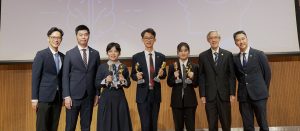
Zhang Lingxiao (middle) wins the championship in the second UM Mental Health Public Speaking Contest
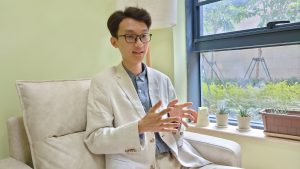
Zhang Lingxiao
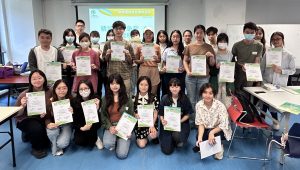
Students participate in the Mental Health First Aid Standard Course
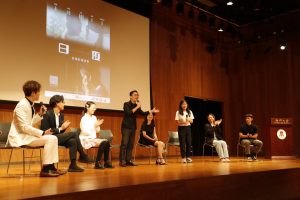
Premiere of The Invisible Self at UM’s Student Activity Centre
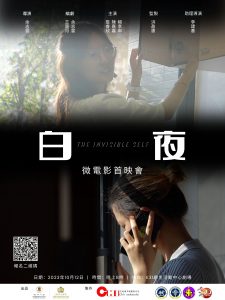
The Invisible Self explores student self-care
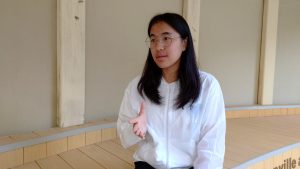
Wang Chuyue
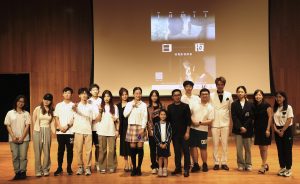
Production crew of the microfilm
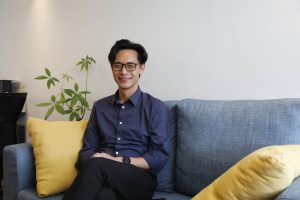
Dr Sou Kuai Long
